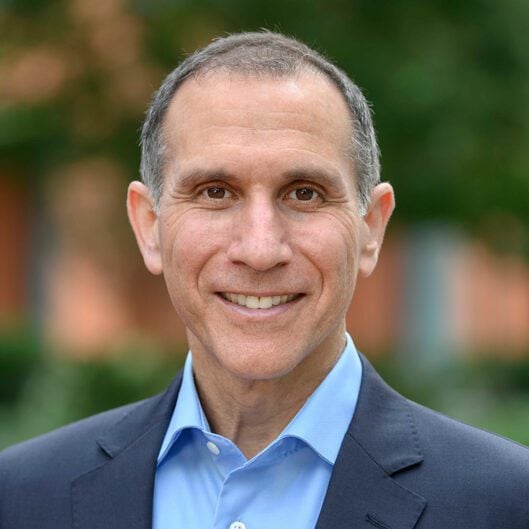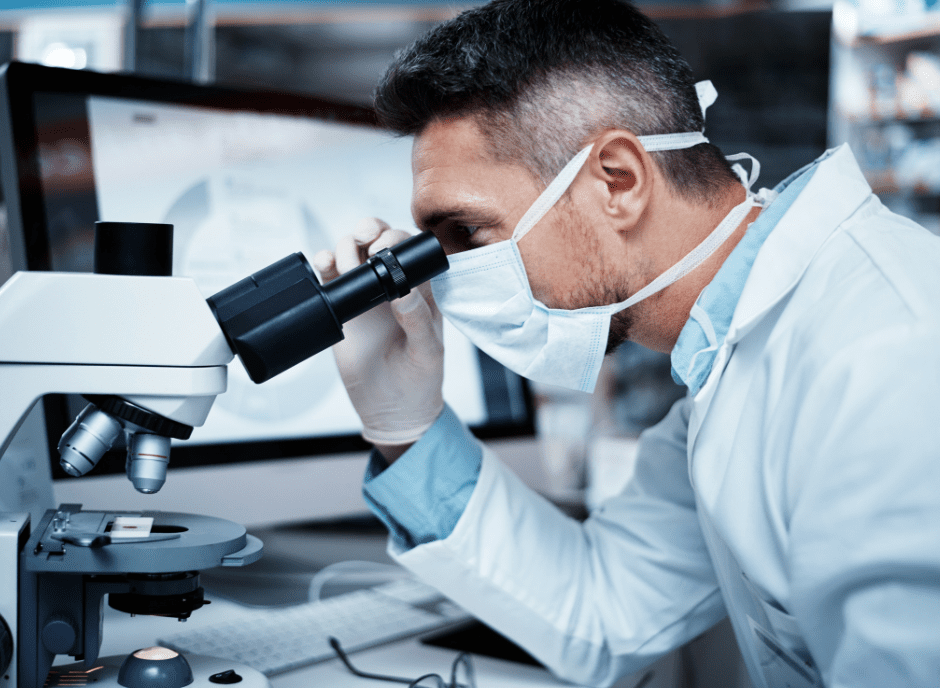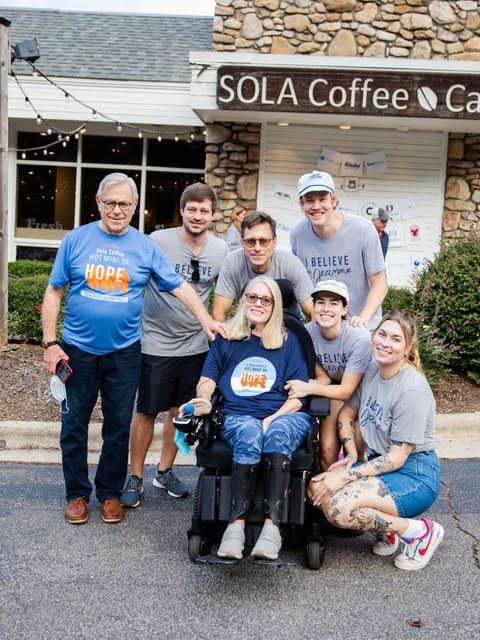
When Jeanne Luther was diagnosed with ALS in 2018, her family found themselves at the edge of a reality few understand until they live it: the slow loss of physical ability paired with a heightened urgency to live with purpose. Rather than turning inward, the Luthers opened their doors wider; to their community, to conversation, and ultimately, to a movement that is advancing ALS awareness, fueling research, and inspiring hope far beyond the walls of their Raleigh coffee shop.
Today, Sola Coffee is not only a local landmark, it is a beacon for the ALS community. What began as one family’s story of loss has grown into one of the most powerful examples in the country of how grassroots action can accelerate awareness and strengthen the human spirit in the face of a devastating disease.
A Legacy Built on Connection
Before Sola Coffee became a rallying point for ALS awareness, it was simply a gathering space founded on hospitality and belonging. Jeanne and her husband, John, opened the café in 2012 with the conviction that a cup of coffee could be more than a transaction; it could be an act of love. They welcomed everyone, learned their names, listened to their joys and struggles, and built a community rooted in presence.
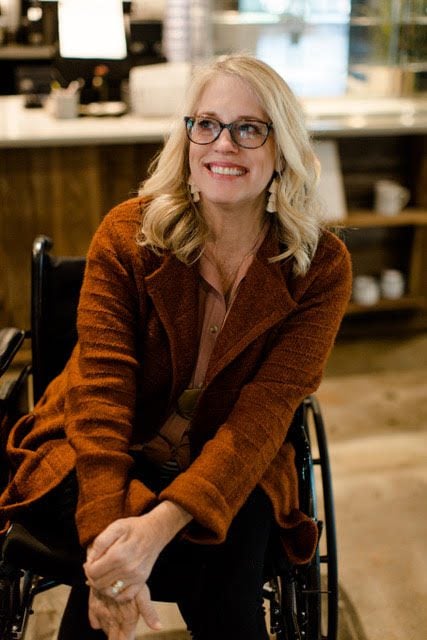
That foundation would become essential when Jeanne first noticed subtle changes: difficulty buttoning a shirt, opening a water bottle, typing a text. After months of uncertainty, she was diagnosed with amyotrophic lateral sclerosis (ALS), a progressive neurodegenerative disease with no cure.
Like many families, the Luthers had only a basic awareness of ALS: Lou Gehrig’s disease, a memory of the Ice Bucket Challenge. But soon, ALS was no longer a concept. It was personal. It was daily. And it was urgent.
Caregiving as an Act of Faith and Defiance
From the moment of her diagnosis, Jeanne chose to face the disease with openness and courage. Rather than stepping away from the community, she remained a visible presence at Sola. Her family cared for her in the most intimate ways; lifting her from bed at night, adjusting her position when she could no longer move, carrying her down beach steps so she could feel ocean water on her skin.
ALS is often described as isolating. The Luthers made it connective. ALS is often described in terms of what is lost. The Luthers turned it into a conversation about what remains: love, community, purpose, and hope.
Their faith guided them, but it was their deliberate decision to live publicly with ALS that changed everything. As Jeanne’s body weakened, her influence grew. She could no longer serve customers with her hands, so she served them with her presence. She listened. She encouraged. She made people feel known. And that, as her family explains, was her true superpower.
When a Community Takes Action
In Sola’s early years, the family hosted a small coffee shop 5K to support wounded veterans. After Jeanne’s diagnosis, that event transformed into the Sola Hot Mini 5K to End ALS. What began as a local fundraiser quickly became one of the most impactful community-driven ALS events in the nation. In 2018, they raised $37,000 and this year they raised $192,000 with over 1,200 runners.
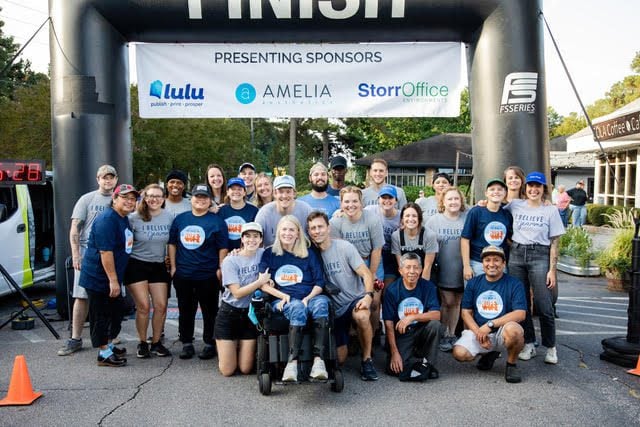
The race is unlike any other ALS event in the country. It is not quiet or somber. It is filled with joy, grit, tears, and unwavering solidarity. Participants run not just for Jeanne but for mothers, fathers, neighbors, and friends across the United States living with or lost to ALS. Each year, more people travel from across the country to be part of it, not only to run, but to belong.
Colin and Sally Leonard, Jeanne’s daughter and son-in-law who now run Sola alongside John, describe the race as “a space where people come not just to remember, but to act. ALS takes so much away, but on that day, we get to take something back.”
Transforming Loss Into Legacy
Jeanne passed away in April 2022 after three and a half years living with ALS. Her final years were marked not by retreat, but by an expanding circle of impact. In sharing her journey openly, she helped thousands confront ALS not with fear, but with compassion and urgency.
Today, her legacy is visible in every cup of coffee served at Sola, every runner crossing the finish line, and every dollar invested in ALS because a community chose to care.
Through their fundraising efforts, the Luther family has partnered with organizations such as the Team Drea Foundation founded by athlete and ALS advocate Andrea Lytle Peet, the first person with ALS to complete a marathon in all 50 states, which funds bold, innovative research and inspires people to live bravely in the face of this devastating disease.
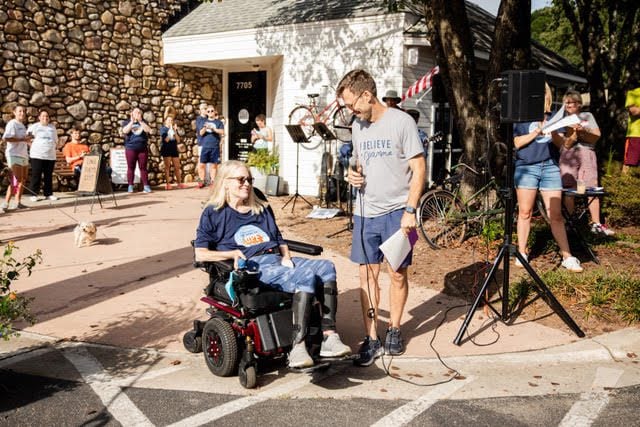
Why Stories Like This Matter
ALS is not rare, it is under-recognized. Every ninety minutes, someone in the U.S. is diagnosed with the disease. Yet because caregiving often happens inside the home and progression can rapidly limit public visibility, ALS remains largely invisible in public discourse.
The Luther family is changing that.
By allowing their personal journey to become a public catalyst, they have helped more people understand ALS including what it is, who it affects, and why funding research is urgent. They have also demonstrated something equally important: a diagnosis does not end a life’s purpose. Sometimes, it reveals it.
In Raleigh, more people now know the term ALS than ever before. Not because of a national campaign, but because of one family coffee shop that chose to turn pain into purpose.
Lighting the Path Forward
As ALS research advances, from biomarkers to therapeutic targets to genetic understanding, community support is what fuels the scientific engine. Stories like Jeanne’s are not only powerful; they are essential.
They remind us that behind every clinical trial is a real person. Behind every breakthrough is a family. And behind every dollar raised is a community refusing to accept ALS as a life sentence.
Next year, the Sola Hot Mini 5K aims to continue to exceed its fundraising targets. But for the Luther family, this is not a finish line. It is a milestone on the path toward a future where ALS is treatable, and survivable.
Thanks to families like the Luthers and communities like Sola, the course of ALS is changing. Learn more here.
